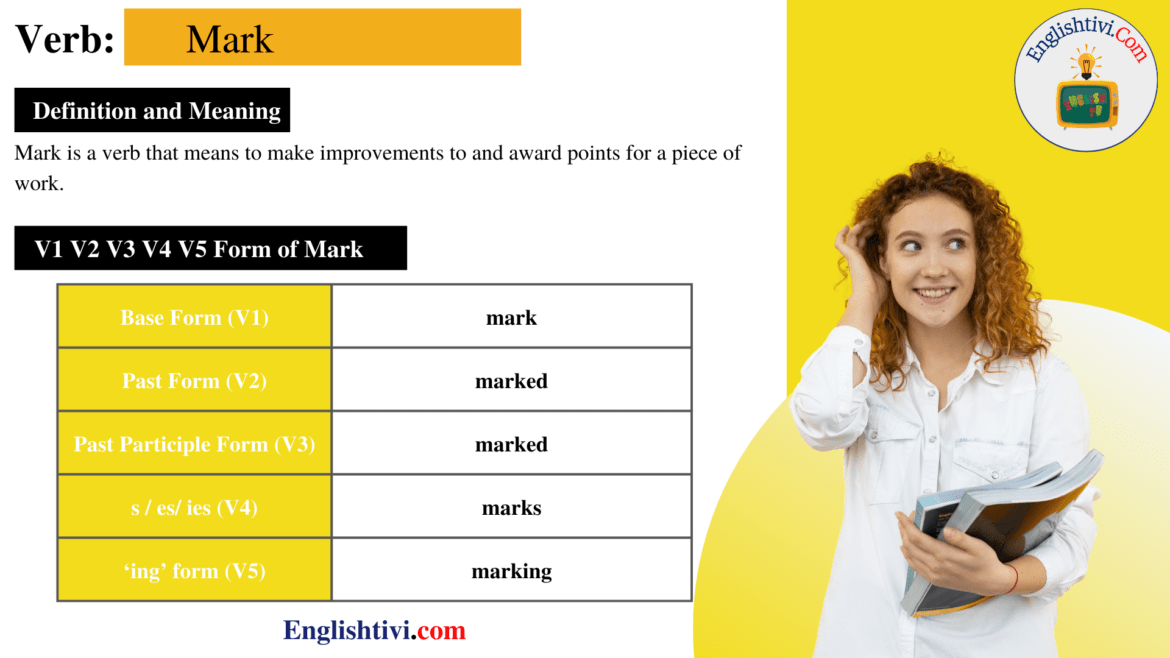Mark V1 V2 V3 V4 V5 is one of the verbs that are used very commonly in English tests as well as in everyday communication. Also, because it’s an irregular verb, mark doesn’t follow the regular rule. The verb “mark” has five different forms: base form, past simple, past participle form, present perfect, and present perfect participle. So what is mark‘s past? How do conjugate verbs with mark verbs?
⏩ Sign Up to Get Bonus
Let’s find out with English tivi in the article below.
See more at: Verbs
Mark of Definition and Meaning
Mark is a verb that means to make improvements to and award points for a piece of work
V1 V2 V3 V4 V5 Form of Mark
| Base Form (V1) | mark |
| Past Form (V2) | marked |
| Past Participle Form (V3) | marked |
| s / es/ es (V4) | marks |
| ‘ing’ form (V5) | marking |
Mark of Past Simple V2
The verb Mark is also employed in its V2 form as “marked”’. It is used to indicate the past tense in sentences.
Mark of Past Participle V3
The V3 form is identical to the V2 form. The V3 form is “marked”. Marked is used in the past or present perfect tense.
+ In the present perfect tense, we use the word V1 as ‘have + marked‘ or ‘has + marked'.
- I, you, and we are used as ‘have + marked‘.
- ‘has + marked' is used for he, she, and it.
+ If you need to use the past perfect tense, use ‘had + marked‘ regardless of the subject.
You might also like: ALL the English Grammar Basics You Need
Conjugation of Mark V1 V2 V3 V4 V5
| Conjugation table: Mark | |||
| Number | Singular | ||
| Present Simple of mark | I | You | She/He/It |
| mark | mark | marks | |
| Plural | |||
| We | You | They | |
| mark | mark | mark | |
| Present Continuous of mark | I | You | She/He/It |
| am marking | are marking | is marking | |
| Plural | |||
| We | You | They | |
| are marking | are marking | are marking | |
| Present Perfect of mark | I | You | She/He/It |
| have marked | have marked | has marked | |
| Plural | |||
| We | You | They | |
| have marked | have marked | have marked | |
| Present Perfect Continuous of mark | I | You | She/He/It |
| have been marking | have been marking | has been marking | |
| Plural | |||
| We | You | They | |
| have been marking | have been marking | have been marking | |
| Past Simple of mark | I | You | She/He/It |
| marked | marked | marked | |
| Plural | |||
| We | You | They | |
| marked | marked | marked | |
| Past Continuous of mark | I | You | She/He/It |
| was marking | were marking | was marking | |
| Plural | |||
| We | You | They | |
| were marking | were marking | were marking | |
| Past Perfect of mark | I | You | She/He/It |
| had marked | had marked | had marked | |
| Plural | |||
| We | You | They | |
| had marked | had marked | had marked | |
| Past Perfect Continuous of mark | I | You | She/He/It |
| had been marking | had been marking | had been marking | |
| Plural | |||
| We | You | They | |
| had been marking | had been marking | had been marking | |
| Future Simple of mark | I | You | She/He/It |
| will/shall mark | will/shall mark | will/shall mark | |
| Plural | |||
| We | You | They | |
| will/shall mark | will/shall mark | will/shall mark | |
| Future Continuous of mark | I | You | She/He/It |
| will/shall be marking | will/shall be marking | will/shall be marking | |
| Plural | |||
| We | You | They | |
| will/shall be marking | will/shall be marking | will/shall be marking | |
| Future Perfect of mark | I | You | She/He/It |
| will/shall have marked | will/shall have marked | will/shall have marked | |
| Plural | |||
| We | You | They | |
| will/shall have marked | will/shall have marked | will/shall have marked | |
| Future Perfect Continuous of mark | I | You | She/He/It |
| will/shall have been marking | will/shall have been marking | will/shall have been marking | |
| Plural | |||
| We | You | They | |
| will/shall have been marking | will/shall have been marking | will/shall have been marking | |
| Conditional Present of mark | I | You | She/He/It |
| would mark | would mark | would mark | |
| Plural | |||
| We | You | They | |
| would mark | would mark | would mark | |
| Conditional Perfect of mark | I | You | She/He/It |
| would have marked | would have marked | would have marked | |
| Plural | |||
| We | You | They | |
| would have marked | would have marked | would have marked | |
| Conditional Present Continuous of mark | I | You | She/He/It |
| would be marking | would be marking | would be marking | |
| Plural | |||
| We | You | They | |
| would be marking | would be marking | would be marking | |
| Conditional Perfect Continuous of mark | I | You | She/He/It |
| would have been marking | would have been marking | would have been marking | |
| Plural | |||
| We | You | They | |
| would have been marking | would have been marking | would have been marking | |
| Present Subjunctive of mark | I | You | She/He/It |
| mark | mark | mark | |
| Plural | |||
| We | You | They | |
| mark | mark | mark | |
| Past Subjunctive of mark | I | You | She/He/It |
| marked | marked | marked | |
| Plural | |||
| We | You | They | |
| marked | marked | marked | |
| Past Perfect Subjunctive of mark | I | You | She/He/It |
| had marked | had marked | had marked | |
| Plural | |||
| We | You | They | |
| had marked | had marked | had marked | |
| Imperative of mark | I | You | She/He/It |
| mark | |||
| Plural | |||
| We | You | They | |
| Let’s mark | mark | ||
See more at: Vocabulary
Example Sentences with Mark V1 V2 V3 V4 V5
In this section, we will learn about mark sentence examples:
- Teachers often have to stay up late to mark.
- Jack's test was marked higher than the others.
- William happened to discover a blank piece of paper in a candidate's answer book while he was marking exam papers.
- 2018 marks the centennial of the structure's construction.
Synonym Words For Mark
Synonym of mark word list. Here are a variety of words whose meaning is nearly the synonym of mark:
- grade
- assess
- correct
- evaluate
- appraise
- gage
- gauge
- rate
- judge
Opposite Words For Mark
The antonym of mark word list. Here are some words that have nearly the opposite meaning as mark:
- clean
- cleanse
- purify
- honour
- upgrade
- moralise
- honor
You might also like: Best List of Irregular Verbs in English
Some Frequently Asked Questions About Mark (Verb)
What is the V1 V2 V3 V4 V5 of mark?
The past tense of mark is marked. The third-person singular simple present indicative form of mark is marks. The present participle of mark is marking. The past participle of mark is marked.
| Base Form (V1) | mark |
| Past Form (V2) | marked |
| Past Participle Form (V3) | marked |
| s / es/ es (V4) | marks |
| ‘ing’ form (V5) | marking |
What is the V2 and V3 form of mark?
+ The V2 and V3 form of mark is “marked“.
What is the sentence of mark?
What is the past tense V2 of mark?
+ The past tense of mark is “marked“.
What is the past participle V3 of mark?
+ The past participle of mark is “marked“.
What is the present participle V5 of mark?
+ The present participle of mark is “marking“.
Conclusion
Let’s learn with English TV the structure of the verb “Mark V1 V2 V3 V4 V5“: Base Form, Past Simple, Present Continuous and Present Continuous and Present Continuous and Present Continuous forms. We wish you all the best of luck.
You should subscribe to the English TV YouTube channel if you want to learn more about the English language and improve your proficiency.





